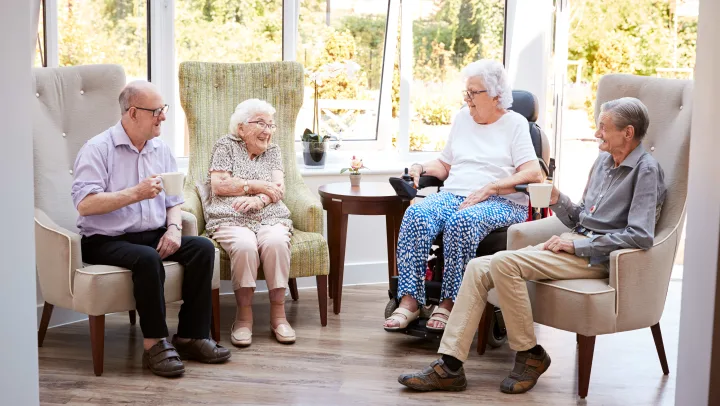Experience high-quality Assisted Living services for seniors.
Experience high-quality Assisted Living services for seniors.
Blog Article
The Role of Assisted Living in Providing Specialized Look After Dementia Sufferers
The arrangement of specialized look after mental deterioration clients within nursing home is increasingly recognized as a crucial component of reliable mental deterioration management. These atmospheres are designed to attend to the unique cognitive and psychological obstacles encountered by individuals with mental deterioration, using customized assistance that advertises safety and security and wellness. By integrating structured regimens and interesting activities, helped living can mitigate feelings of seclusion while enhancing general high quality of life. Nevertheless, the effectiveness of these programs often pivots on different variables, including personnel training and family members participation, prompting a more detailed assessment of exactly how these aspects communicate to enhance treatment end results.
Recognizing Dementia Care Requirements
Recognizing the care requirements of people with mental deterioration is critical for providing reliable assistance and boosting their lifestyle. Mental deterioration is a dynamic neurological condition that influences cognitive features such as memory, reasoning, and communication. Subsequently, individuals with dementia often require aid with day-to-day tasks, customized treatment strategies, and psychological assistance.
Effective dementia care includes acknowledging the special difficulties faced by each person. This includes recognizing the stages of dementia, which can range from mild cognitive disability to sophisticated stages calling for thorough help. Treatment needs may include assistance in handling everyday routines, drug adherence, and keeping social communications to stop isolation.
Additionally, sensory excitement and familiar environments can dramatically enhance the well-being of people with dementia. Caregivers must be trained to identify behavioral adjustments and use strategies customized per individual's preferences and past experiences. Strategies such as validation treatment and reminiscence can assist communicate efficiently and foster a feeling of safety and security.
Ultimately, efficiently addressing the treatment needs of people with dementia needs a caring approach, recurring training for caretakers, and a commitment to preserving self-respect and respect throughout the caregiving process.
Benefits of Assisted Living

One more substantial advantage is the safe and safe setting these facilities provide. Citizens benefit from features such as secured entrances and kept track of common areas, reducing the danger of wandering and boosting general safety. Moreover, assisted living promotes social communication amongst locals, fostering a sense of community and belonging. Engaging with peers can ease feelings of seclusion, which prevail in those living with dementia.
Additionally, several nursing home supply assistance with day-to-day tasks, such as medicine management, bathing, and meal preparation. This support permits citizens to keep their independence while guaranteeing their wellness and well-being are prioritized. Eventually, assisted living functions as an important resource, balancing care and autonomy for individuals with dementia and their households.

Specialized Programs and Tasks
(Charlotte Alzheimer's Care)Identifying the special requirements of people with dementia, numerous assisted living centers apply customized programs and activities developed to boost cognitive feature and promote overall health. These programs often consist of cognitive stimulation activities that involve citizens in memory games, problems, and memory therapy, which urges the sharing of individual tales and previous experiences.
In addition, art and music therapy play substantial duties in promoting creative thinking and psychological expression (Assisted Living). Engaging homeowners in painting, crafting, or songs sessions can provide healing advantages, assisting to lower stress and anxiety and enhance mood. Physical activities, such as mild workouts and dancing sessions, are also important, as they promote flexibility and physical wellness while urging social communication amongst locals
Structured daily regimens are frequently established to give a feeling of stability and predictability for people with mental deterioration. These routines can include set up meal times, group activities, and individualized care plans that accommodate specific rate of interests and capabilities. By creating an enhancing environment full of customized activities, aided living centers not only improve the top quality of life for mental deterioration people however also promote a sense of neighborhood and belonging.
Trained Personnel and Support
(Assisted Living Charlotte)In assisted living centers, the existence of skilled personnel is crucial for supplying reliable support to people with dementia. These specialists have specialized expertise and abilities to deal with the one-of-a-kind needs of homeowners, guaranteeing their safety and security, comfort, and well-being. Team participants receive training in mental deterioration treatment, which includes understanding the development of the condition, identifying behavioral adjustments, and utilizing efficient communication techniques.
In addition, skilled staff are outfitted to apply customized treatment plans tailored to each homeowner's choices and capabilities. This individualized approach cultivates a feeling of autonomy and dignity, allowing homeowners to participate in purposeful tasks that boost their top quality of life. The Dementia Care Charlotte team also play a crucial function in checking wellness and wellness, without delay determining any type of adjustments in condition that might require clinical focus.
In enhancement to guide care, qualified team provide psychological assistance to locals, helping to ease sensations of confusion and anxiousness that usually come with mental deterioration. Their thoughtful strategy produces a caring atmosphere where homeowners really feel valued and comprehended - Memory Care. Ultimately, the proficiency and commitment of trained staff are essential in providing thorough care that fulfills the complicated needs of people coping with dementia in assisted living setups
Family Involvement and Resources
Household involvement plays a considerable role in the care of people with dementia in assisted living centers. Engaging member of the family in the treatment process not just boosts the psychological wellness of the local yet also cultivates a collective environment where care strategies can be customized to specific demands. Family members can offer important understandings into the choices, background, and actions of their liked ones, which can inform caretakers and cause even more tailored care techniques.
Moreover, helped living centers usually offer sources for family members, such as support groups and educational workshops. These sources can aid households comprehend mental deterioration, improve communication approaches, and establish coping mechanisms. Involvement in these programs can encourage family members, outfitting them with the devices needed to support their liked ones properly.
In addition, regular interaction in between households and staff is important. This ongoing discussion enables families to stay notified regarding their liked one's progression and any type of adjustments in care plans. Eventually, a solid partnership between households and aided living facilities cultivates an atmosphere of trust and understanding, making sure that people with dementia obtain the specialized care they are entitled to while preserving their family members links.
Conclusion
In conclusion, aided living centers play an important function in addressing the distinct requirements of mental deterioration people through individualized care and support. By fostering secure environments, promoting social communication, and executing structured regimens, these centers improve the overall health of locals. The participation of trained staff and households further enhances the care experience, making certain that individual preferences and histories are respected. Eventually, assisted living supplies necessary sources that considerably improve the quality of life for those dealing with mental deterioration.
Report this page